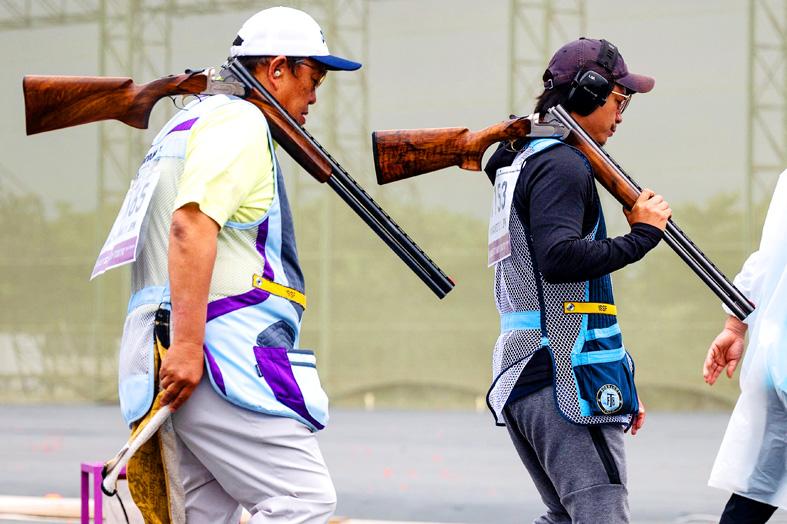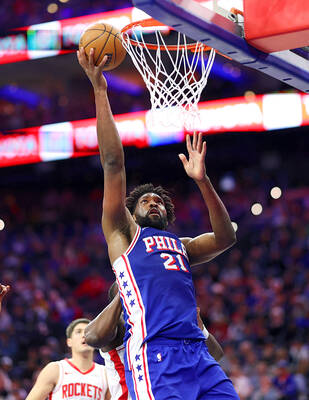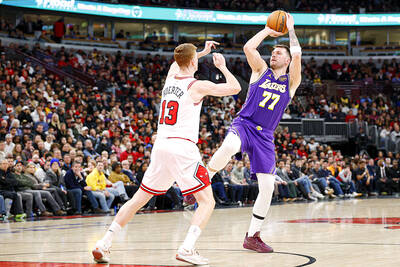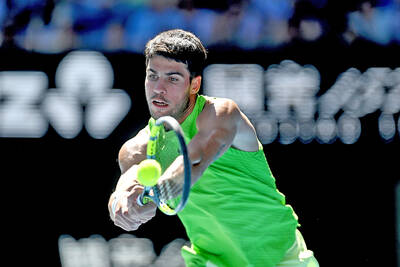Some of the world’s toughest gun-control laws are posing unusual problems at the Tokyo Olympic Games, from the coach who cannot touch a firearm to strict limits on ammunition.
For Goran Maksimovic, the extent of Japan’s restrictions only became clear when he arrived to coach the national team and found he could not lay a finger on a gun, let alone fire one.
“I was very surprised in the beginning,” said the Serb, a 10m air rifle gold medalist at the 1988 Seoul Games.

Photo: AFP
Just 500 people can own an air pistol in Japan, whose history of controlling guns and other weapons dates back hundreds of years.
Japan’s gun laws are among the strictest in the world and annual deaths from firearms in the country of 125 million people are regularly in single figures.
Getting a gun license is a long and complicated process even for Japanese citizens, who must first get a recommendation from a shooting association and then undergo strict police checks.
It is even more difficult for foreigners, with Maksimovic having to use Japanese assistants as intermediaries when he is coaching.
During the Games, coaches are to be allowed to help with “minor repairs,” as long as the athlete is holding the weapon.
The rules have been relaxed so that technical officials can handle firearms and inspect ammunition under International Shooting Sport Federation rules.
Working around local legislation has been a complicated process, National Rifle Association of Japan president Kiichiro Matsumaru said.
“We were involved in negotiations with the police and government so that teams coming here wouldn’t have any complaints,” he said.
Japan has a limit of 800 rounds of ammunition per shooter at any one time, fewer than at previous Olympics and other international competitions.
Organizers had to come up with a “complex plan” to stop competitors from potentially running out of bullets, Tokyo Games shooting sport manager Peter Underhill said.
“This has been introduced specifically for Tokyo, to help mitigate the effects of this particular piece of legislation,” he said.
There will be a few options, including shipping bullets to Japan through a designated contractor, but the rounds must be stored outside the shooting venue and brought in to replenish supplies.
Teams will also be able to buy ammunition at the Olympic shooting range, though they’ll have to settle for whatever is available, which may differ from their usual specifications.

The Philadelphia 76ers, fueled by 36 points from Tyrese Maxey and a triple-double from Joel Embiid, on Thursday beat the Houston Rockets 128-122 in an NBA overtime thriller. Cameroonian big man Embiid scored 32 points, grabbed 15 rebounds and handed out 10 assists, posting the ninth triple-double of his career to help the Sixers end the Rockets’ three-game winning streak. Rockets star Kevin Durant scored 36 points and Amen Thompson added 17, but Thompson was scoreless in the fourth quarter. Even so, the Rockets led by nine midway through the final frame, Maxey tying it at 115-115 with 40.1 seconds left. Durant missed a

The Milwaukee Bucks’ Giannis Antetokounmpo on Friday said that he will probably be out for an extended period after hurting his right calf again after a similar injury caused him to miss eight games earlier this season. Antetokounmpo had his right calf wrapped in the first half of their 102-100 loss to the Denver Nuggets. He did not appear comfortable the rest of the night and left for good with 34 seconds remaining. “At the end, I could not move no more, so I had to stop playing,” Antetokounmpo said. The two-time NBA Most Valuable Player said he expected to undergo an MRI

Luka Doncic on Monday produced a 46-point masterpiece as the Los Angeles Lakers snapped the Chicago Bulls’ four-game winning streak with a 129-118 victory on the road. Doncic rattled in eight three-pointers on 15-of-25 shooting from the field, finishing with seven rebounds and 11 assists to lead an impressive Lakers effort at the United Center. LeBron James chipped in with 24 points, five rebounds and three assists, while Rui Hachimura delivered an eye-catching cameo off the bench with 23 points from nine-of-11 shooting. The win was another encouraging result for the Lakers after a 116-110 defeat of the Dallas Mavericks on Saturday. “We did

Taiwanese FORTUNES: Wu Fang-hsien and Hsieh Su-wei both advanced to the last 16 of the women’s doubles, but Ray Ho was ousted in the men’s doubles Carlos Alcaraz yesterday stepped up his quest to win a maiden Australian Open as he overwhelmed showman Corentin Moutet to reach the last 16, while Taiwan’s Wu Fang-hsien and Hsieh Su-wei both advanced to the last 16 of the women’s doubles. Three-time finalist Daniil Medvedev battled through on day six at a warm and sunny Melbourne Park, as did Coco Gauff. Top seed Alcaraz was never in danger against French 32nd seed Moutet, easing through 6-2, 6-4, 6-1 at Rod Laver Arena in 2 hours, 5 minutes. It was the Spaniard’s 100th Grand Slam match and he boasts a remarkable 87-13 win-loss record,